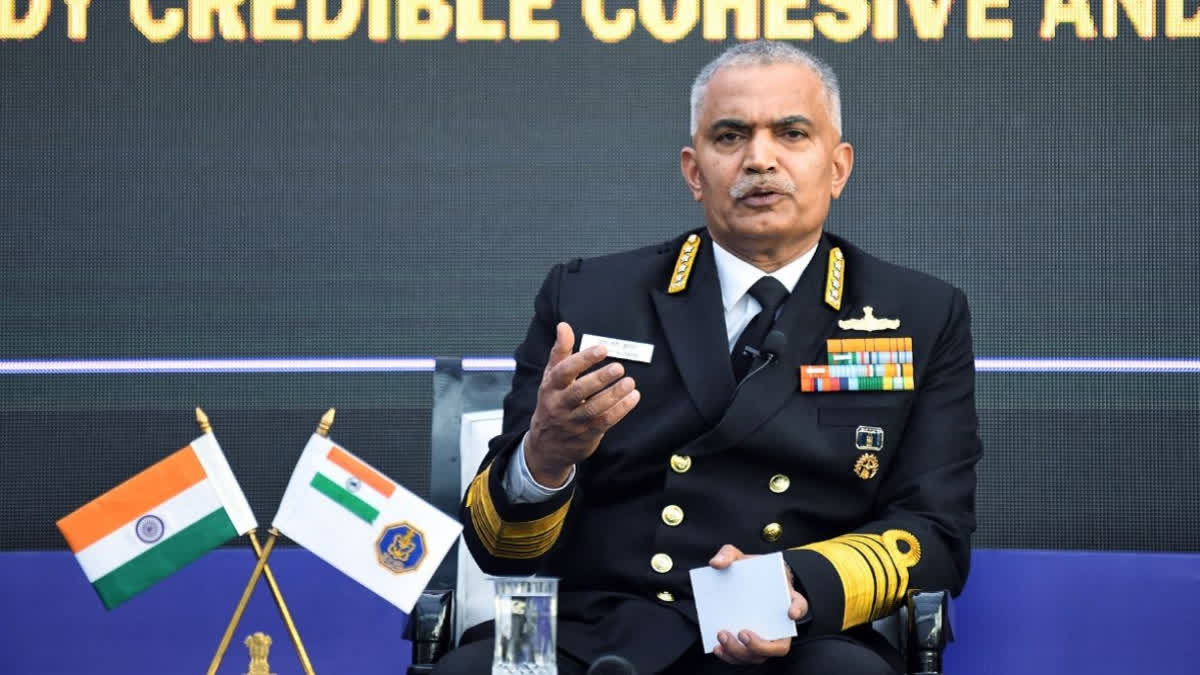New Delhi: There is a "large presence" of Chinese vessels in the Indian Ocean Region and India keeps a "very close watch" on the developments in the region to protect and preserve its national interests in the maritime domain, Navy Chief Admiral R Hari Kumar said on Saturday.
During an interaction at a conclave here, he also said that the Indian Navy is seized of the docking of various PLA Navy ships at ports in Pakistan, and it is "keeping a watch on it". Asked about the threat aspects, the Navy chief spoke of both conventional and non-conventional threats, besides those emerging from what he described as "silent and inclusive paradigm" resulting in a "web of threats" that are emerging.
The Indian Navy's role is to protect, promote and preserve national interests in the maritime domain, wherever they are, and it asses the threats and challenges. On a daily basis, it is being seen that there is a certain amount of contestation happening at sea. It is well below the threshold of conflict, but possibility of a full-fledged cannot be ruled out, the Navy chief said.
On a question on PLA Navy ships docking at ports in Pakistan, he said, these ships are docking at ports in various countries, and not just in Pakistan. As far as their visit to ports in Pakistan are concerned, "we are ceased of it, and keep a watch on", he said. Admiral Kumar said the Pakistan Navy is modernising itself at a good pace and seeks to become a 50-platform force in 10-15 years, and they are adding new corvettes and frigates to their fleet.
Also read: Border standoff: China sings peace amid India's tough talk
As far as China is concerned, in the last 10 years, a large number of ships and submarines have been Commissioned by it in the last ten years, the third aircraft carrier is under construction, and much larger destroyers they are working on, he said, adding, "we feel this will plateau at some time". "We are keeping a very close watch in the Indian Ocean Region... and effort is to know whose presence is there and what are they up to, monitoring it 24x7 and we deploy aircraft, UAVs, ships, submarines, etc.," the Navy chief said.
"There is a large presence of Chinese vessels. At any point of time, there are 3-6 Chinese warships in the India Ocean Region," he said, adding some are close to the Gulf of Oman, and some in the eastern part of the IOR, among other places. Chinese research vessels are ever present, numbering from 2-4 and Chinese fishing vessels as well. So, there is a large presence of Chinese vessels in the Indian Ocean Region, and India Navy keeps track of it, the Navy chief said.
"So, we refine our plans, actions that are required to be taken, and this also feeds into our capability development," the Navy chief said. Later, in response to a query from audience on Chinese research vessels, Admiral Kumar said, these vessels have the ability to track and collect electronic signals. When they operate, close to "our areas of national interest", the Indian Navy keeps an eye, and it has its ships which "monitor them very, very closely".
On a question on whether modernisation and capability development has any link with threat assessment, he said, modernisation is part of the process and not threat-driven. And, a Navy has to be a "well-balanced force", so, it's not about nuclear submarine vis-a-vis aircraft carrier, as each of the two bring their own capabilities and they are "not either/or", Admiral Kumar said. (Agency inputs)



